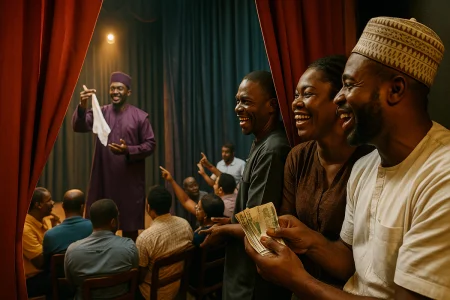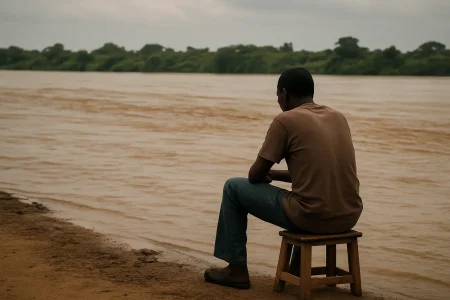
Digest
- Nigeria’s political class often treats party loyalty as a tool for personal gain, exposing the transactional nature of elite politics and raising questions about the proper health of our democracy.
- Institutions meant to protect the people’s voice, like INEC, the judiciary, and the legislature, are increasingly seen as compromised, leaving ordinary Nigerians feeling sidelined and disillusioned.
- Peter Obi’s move to the Labour Party sparked hope for a new kind of politics, yet also revealed how deeply entrenched elite interests are, and how quickly the status quo can adapt to protect itself.
- The article explores how the real threat to democracy is not just political defections but the slow erosion of trust, meaning, and public agency, challenging us to reflect on what democracy should truly mean for Nigerians today.
Explore the full article below:
When Party Logos Become Fashion Accessories
What happens when politicians wear party logos like some of us wear clothes – easily changed when the season shifts? Look around at Nigeria's political landscape today. The same faces that once dominated PDP rallies now stand comfortably at APC gatherings. Aminu Tambuwal, Godswill Akpabio, Rotimi Amaechi – once PDP stalwarts who changed jerseys when the political winds shifted. This easy exchange of party membership forces an uncomfortable question: What remains of democracy when loyalty to ideas matters less than loyalty to power?Chinua Achebe's warning that "there was a country" echoes more deeply now. He wasn't just mourning a lost nation but a lost possibility – a Nigeria where what you believe might sometimes matter more than who you know. When we see today's political musical chairs, where allegiance shifts with stunning ease, many of us wonder: Has democracy become just another Nigerian product that looks impressive from afar but feels hollow when held in our hands?
How Democracy Can Pave the Way to Its Opposite
When weakened, democracy can actually help bring about the very thing it was created to prevent—authoritarian rule. It's not unlike how some claim certain habits lead to worse ones. In his book "How Democracies Die," Steven Levitsky showed how democratic systems don't typically collapse overnight through military coups. Instead, they erode slowly, worn away by the very people elected to protect them.We see the evidence all around us. Remember 2013-2015? The formation of the New Peoples Democratic Party (nPDP) began as internal dissent but evolved into something larger. Key figures like Bukola Saraki and Atiku Abubakar migrated to the newly formed APC, completely reshaping Nigeria's political map. After 16 years of PDP dominance, power changed hands. But what changed for ordinary Nigerians?
When politicians jump from PDP to APC with the casual ease of changing mobile network providers, they reveal an uncomfortable truth: our system has become less about different visions for Nigeria's future and more about who gets access to power next. Politics transforms into a sophisticated game of musical chairs, where the music stops, but the same people find different seats.
Against this backdrop, Peter Obi's move from PDP to Labour Party in 2022 briefly disrupted our familiar political pattern. Unlike typical defections motivated by power calculations, Obi's shift connected with young Nigerians who felt abandoned by traditional politics. The youth-driven movement he inspired—gathering millions of first-time voters and engaging in social media—showed a hunger for something different. Yet even this disruption revealed how deeply entrenched our political system remains, as establishment forces reasserted control through familiar channels.
When Every Guardian Becomes a Suspect
The true danger to Nigerian democracy lies not just in politicians switching parties, but in how every institution meant to safeguard our system appears increasingly compromised. Look at what many Nigerians now perceive:An electoral commission (INEC), whose independence is routinely questioned after each controversial election. Courts deliver seemingly contradictory judgments depending on which political interests are at stake. A legislature that often appears more committed to self-enrichment than representation. Security agencies can seem selective in which corruption cases they pursue.
When all the referees in a game appear to favour certain players, can the match truly be fair? This systematic weakening of institutional integrity creates a situation where democracy exists on paper but struggles in practice. Each compromised institution removes another check on power, another safeguard against abuse, another protection for ordinary citizens.
Bob Dylan's haunting question from "Blowin' in the Wind" resonates powerfully here: "How many times can a man turn his head and pretend that he just doesn't see?" In Nigeria's political environment, we've mastered the art of institutional blindness. Officials see corruption, electoral manipulation, and abuse of power, yet pretend they don't – maintaining business as usual while democracy quietly suffocates.
The most dangerous aspect isn't just that these institutions may be captured, but that many Nigerians increasingly expect them to be. When citizens lose faith in electoral results before votes are even cast, when court judgments are pre-judged based on political alignments rather than legal merit, democracy's foundation cracks at its very core.
Yesterday's Danger Signs Become Today's Normal
Listen carefully, and you'll hear echoes from different eras of our democracy. During President Obasanjo's tenure, Nigeria stood at a dangerous crossroads as the "third term agenda" nearly expanded presidential term limits. That specific threat faded, but the underlying impulse never disappeared.Today's political class has found more subtle approaches. Rather than changing constitutions outright, they've learned that controlling key institutions works better – capturing electoral bodies, courts, and security agencies. These are the quiet battlegrounds where Nigeria's democratic future is truly being decided, far from campaign rallies and political speeches.
This pattern isn't unique to Nigeria. Look around Africa. How many countries have we seen where democracy arrived with great promise, only to transform into one-party dominance gradually? From nations once celebrated as democratic success stories to those still struggling with basic voting, we see a common story: the procedures of democracy remain while its substance slowly disappears. Elections still happen, parties still compete, but power stays concentrated in the same hands
The Price We Pay for Political Theatre
The cost of this political musical chairs isn't just theoretical – it affects our daily lives. When accountability vanishes beneath shifting party loyalties, corruption becomes not the exception but the rule. Public trust, already fragile, breaks further when yesterday's anti-corruption champion becomes today's corruption defender. Most dangerous of all, we as citizens slowly stop expecting things to ever change, perhaps the most valuable thing democracy should provide.Fela Kuti captured this resignation perfectly in "Suffering and Smiling." As he observed Nigerians enduring hardship while leaders prospered, he noted how we've learned to normalize our pain – "Everyday my people dey inside bus...forty-nine sitting, ninety-nine standing." This capacity to endure, to smile through suffering, becomes both survival mechanism and trap. We adapt to democratic decline just as we've adapted to every other dysfunction, finding ways to navigate a broken system rather than demanding its repair.
This brings us to the central question facing our political system: Are our democratic structures actually representing people's interests, or have they become elaborate covers for powerful interests operating with increasing freedom? When politicians switch parties while their personal bank accounts consistently grow – regardless of what happens to public services – the answer becomes uncomfortably clear.
Can Nigeria's Broken Democracy Be Put Back Together?
Achebe's warning wasn't just about the past, but speaks directly to our present moment. Nigeria's fragile democracy needs more than recognition – it needs protection. The question now facing every Nigerian is whether we can spot these subtle shifts toward authoritarianism before they become permanent. Defending democracy requires more than voting every four years – it demands constant vigilance against the small erosions that eventually lead to collapse.Perhaps what Nigerian democracy needs most isn't better politicians but better citizens – people who understand that commitment to democratic principles must run deeper than loyalty to political personalities or parties. Our political system continues to be captured by the powerful precisely because we've allowed party affiliations to become like football team loyalties rather than expressions of shared values about Nigeria's future.
As another election cycle inevitably approaches with familiar promises of transformation, we face a choice more fundamental than which candidate to support. We must decide whether democracy will remain just a procedure—a ritual every four years with predictable results—or whether it can still deliver its essential promise: a government that truly represents the people's will. The answer will determine not just who governs Nigeria but whether Nigeria's government still meaningfully belongs to ordinary Nigerians at all.
What kind of democracy might emerge if we stopped "suffering and smiling" and demanded actual ideas instead of just new party symbols? What would our political landscape look like if changing parties carried a real cost? And how many times will we turn our heads and pretend not to see democratic erosion—from compromised electoral bodies to politically aligned courts—before these abnormalities become our permanent reality?




